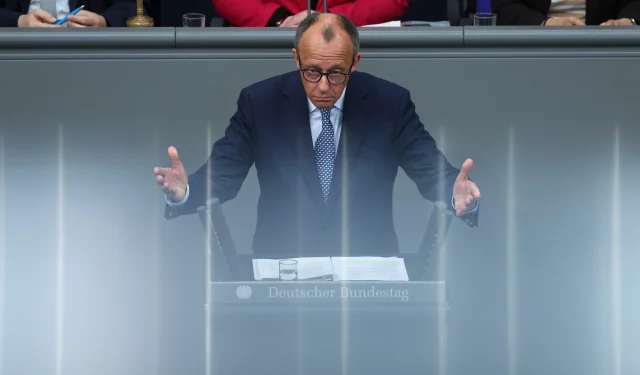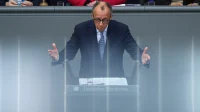Challenges Facing Germany’s Film Industry Amidst Political Turmoil
As Germany’s political landscape undergoes significant transformation, the nation’s film industry finds itself grappling with a multitude of challenges, often overlooked by the current government negotiations. Following the recent federal elections, Chancellor-designate Friedrich Merz and his conservative Christian Democrats (CDU) have turned their attention to pressing matters, prioritizing public finances and coalition negotiations with the left-leaning Social Democrats (SPD).
This preoccupation is concerning for local producers struggling to navigate a difficult year. In 2024, theater admissions plummeted by 5.8% to 90.1 million, indicating a stark decline compared to other Western European markets. Additionally, domestic films represented only 20.6% of the market share, a drop of 3.7%. Compounding these challenges, television revenues are also declining as commercial advertising rapidly diminishes. A survey conducted among 375 members of the German Production Alliance reveals that 80% of producers are currently facing financial hardships.
Government Support and Legislative Changes
In a bid to bolster the struggling industry, the previous government approved an updated film funding law at the end of last year, which preserved essential state subsidies for local productions. These subsidies are crucial for sustaining German film production; without them, the industry could face a dire standstill. However, in negotiations with Merz’s CDU, the law refrained from including mandatory standards for diversity, gender equality, and anti-discrimination in filmmaking.
Infrastructure development in the industry hinges on new tax incentives aimed at enhancing Germany’s competitiveness with its European counterparts. Rising production costs in the U.S. have prompted studios and indie filmmakers to seek more favorable conditions in Europe, yet Germany’s existing incentive model falls short when compared to those in places like Spain, Italy, Austria, and the Czech Republic.
“We’ve spoken to the studios, they want to bring productions here but they need the tax incentive to do so,” noted the head of one of Germany’s biggest backlots. “If things don’t change soon, they will go elsewhere. The damage will be irreversible.”
The Future of Streaming in Germany
Another potential lifeline for German producers comes in the form of legislation that would obligate streaming platforms to invest in local productions. This proposal—previously stalled under the outgoing administration—poses significant benefits for the German film sector, especially with the dominance of platforms like Netflix and Amazon. Yet, its future remains uncertain pending the formation of the new government.
Political Negotiations and Economic Implications
The timeline for a new coalition government remains ambiguous, as the newly elected Bundestag is slated to convene for its first session on March 25. Without a clear majority from the recent elections, Merz’s CDU is currently engaged in coalition talks with the SPD to reach consensus on various contentious issues, including immigration and economic policies. Notably, Germany’s far-right party, the AfD, achieved a surge in support, receiving 21% of the vote, yet the CDU and other mainstream parties have pledged to exclude them from the new government.
Both the CDU and SPD recognize the need for increased financial resources, which has led to ongoing discussions regarding amendments to Germany’s “debt brake,”a constitutional regulation limiting governmental borrowing. Merz aims for a constitutional change to facilitate significant investments in military and infrastructure, given the geopolitical uncertainties. However, passage will require a two-thirds majority in parliament, a challenging feat in the current political climate.
For the beleaguered film and television sector, the government’s willingness to consider financial incentives is a positive indicator. Veteran filmmakers express cautious optimism, noting that discussions surrounding tax breaks for various industries could similarly apply to film. However, the urgency of the situation cannot be overstated; each week that passes without new tax incentives risks further losses as projects relocate abroad.
“The international competitiveness of Germany as a film location depends on a competitive tax incentive model,” said Björn Böhning, CEO of the German Production Alliance in Berlin. “The new federal government must continue the reforms it has begun. Otherwise, there is a risk of a rollback instead of progress.”
The coming weeks will be pivotal for the future of Germany’s film industry and its ability to adapt amidst political changes. As stakeholders await the new government’s decisions, the industry remains on edge, knowing that swift action will be critical to reclaiming its standing on the global stage.


